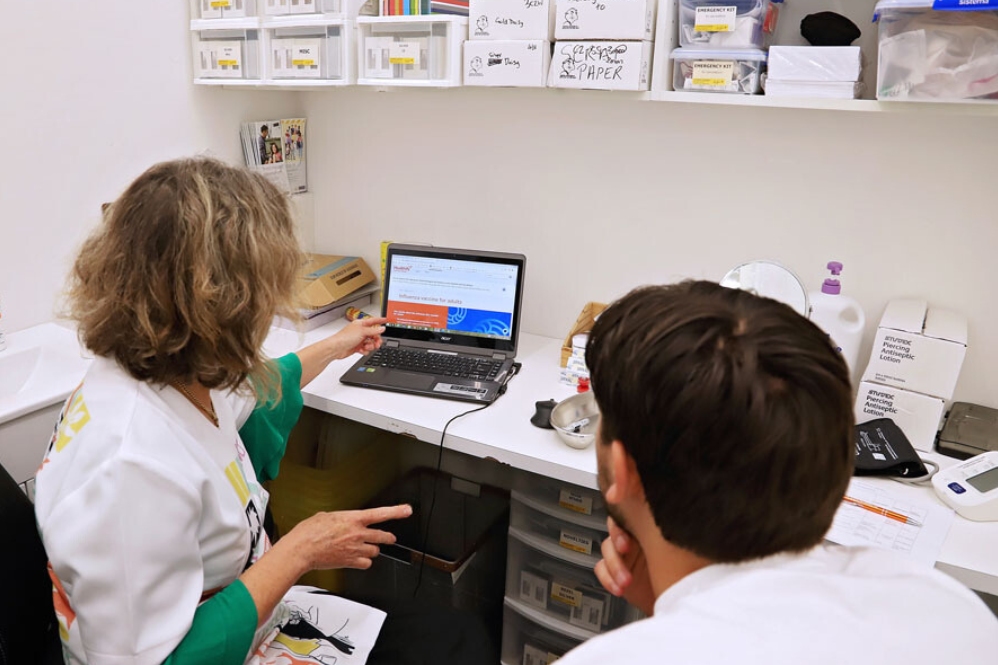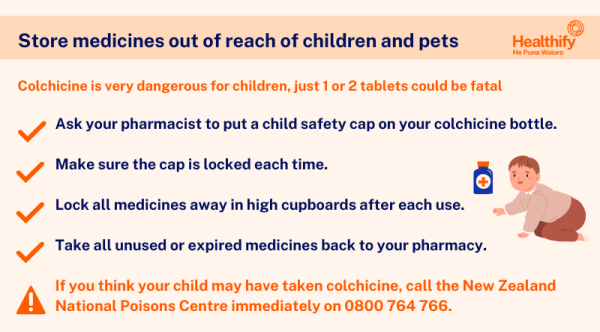You can now add Healthify as a preferred source on Google. Click here to see us when you search Google.
Colchicine for pericarditis
Sounds like 'KOL-chi-seen'
Key points about colchicine for pericarditis
- Colchicine may be used for acute pericarditis, or for recurrent pericarditis.
- Colchicine is also called Colgout®.
- It's important to store colchicine safely, out of reach and out of sight of children.
- Find out how to take it safely and possible side effects.

Colchicine may be used for sudden (acute) pericarditis, to reduce chest pain and ease inflammation. It may also be used if your symptoms tend to come back (recurrent pericarditis). Colchicine may be used in combination with non-steroidal anti-inflammatories (NSAIDs) such as ibuprofen or when NSAIDs aren't suitable. Colchicine reduces the duration of your symptoms and helps prevent the condition from recurring.
Pericarditis is inflammation of the lining around the heart, called the pericardium. There are 2 types of pericarditis – acute and chronic. Acute pericarditis comes on suddenly, with symptoms starting rapidly. Chronic pericarditis lasts for 3 months or longer.
Note: In Aotearoa New Zealand, colchicine is approved by Medsafe (New Zealand's agency for licensing medicines) for use in gout. Colchicine is not approved for use in pericarditis in New Zealand, but it is recommended in other countries for this use. Your healthcare provider will talk to you about the risks and benefits of this medicine so you have enough information to make a decision about using it ‘off-label’. Read more about unapproved medicines.
Keep medication out of reach of children
|
Store colchicine out of reach of children – as little as 1 or 2 tablets may be fatal for children
|

Image credit: Healthify He Puna Wairoa
In Aotearoa New Zealand, colchicine is available as tablets (500 micrograms). The dose of colchicine for pericarditis will depend on your body weight.
- Always take colchicine exactly as your healthcare provider has told you. The pharmacy label on your medicine will tell you how much to take, how often to take it and any special instructions.
- Weight under 70 kg: 1 tablet once daily.
- Weight over 70 kg: 1 tablet twice daily.
- Note: Some people may need a lower dose, for example, if you have kidney problems, get side effects such as stomach upset, or you're taking medicines that interact with colchicine.
- You may need to take colchicine for several months. This could keep your symptoms away for longer.
- Swallow your tablet whole with a full glass of water.
- You can take colchicine with or without food. Some people find that taking colchicine with or after food is easier on the stomach.
Here are some things to know when you're taking colchicine. Other things may be important as well, so ask your healthcare provider what you should know about.
- Alcohol: Avoid drinking alcohol as it can cause stomach problems.
- Grapefruit and grapefruit juice: Don't drink grapefruit juice as it increases the risk of side effects.
- Taking other medicines: Colchicine interacts with some medicines and herbal supplements, so check with your doctor or pharmacist before starting colchicine or before starting any new medicines. This includes medicines that you may only need to take for a short time such as some antibiotics or antifungals and supplements you may buy over the counter.
- Effects on fertility: There are some reports that colchicine can cause a reduced sperm count in men if it's taken long term. But this is usually reversible when you stop treatment. If you're concerned, talk to your healthcare provider. There is no evidence to show that taking colchicine reduces fertility in women.
Colchicine can cause serious side effects, although most people don't get them.
| Side effects | What should I do? |
|---|---|
|
|
|
|
Read more about medicines and side effects and reporting a reaction you think might be a side effect.
References
- Colchicine(external link) New Zealand Formulary
- Factors contributing to colchicine toxicity(external link) Medsafe, NZ, 2025
- 2025 ESC Guidelines for the management of myocarditis and pericarditis(external link) European Society of Cardiology
Credits: Sandra Ponen, Pharmacist, Healthify He Puna Waiora. Healthify is brought to you by Health Navigator Charitable Trust.
Reviewed by: Leah Tomkinson, Clinical Nurse Specialist Cardiology, Christchurch Hospital; Ev Tolerton, Pharmacist Prescriber, Cardiology Service, Christchurch Hospital; Angela Lambie, Pharmacist, Auckland
Last reviewed:
Page last updated:





